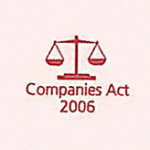 The Companies Act 2006 is changing the law for companies. These changes affect every company operating in the United Kingdom. Passed in 2006, the Act reaches the final stage of implementation on 1st October 2009.
The Companies Act 2006 is changing the law for companies. These changes affect every company operating in the United Kingdom. Passed in 2006, the Act reaches the final stage of implementation on 1st October 2009.
The Companies Act 2006 (“the Act”), which replaces the Companies Act 1985, is being brought into force in four tranches, on 1st October 2007, 6th April 2008, 1st October 2008 and 1st October 2009. The phased introduction is to afford Companies House sufficient time to ensure that their systems and procedures are able to cope with the new legislation. The Act, which is the longest piece of legislation ever, has 1300 sections and 16 schedules, which makes determining what exactly comprises current company legislation in the transitional period rather complicated.
The intention of the Act is to simplify the administration of, in particular, private companies. It should be noted that out of approximately 2.7 million companies on the Companies House Register, only around 11,000 are plc’s.
Some changes previously brought into force are as follows:-
Written Resolutions (where matters can be approved by private company shareholders without requiring to actually hold a meeting) have been in use for some time. A resolution can now be validly passed if the required majority of shareholders (ordinary resolution – 50%; special resolution – 75%) sign the resolution, whereas previously all shareholders required to signify their consent.There is now no longer a requirement for a company to hold an Annual General Meeting for the annual accounts to be laid before the members, and for other formal business to be transacted. Members (subject to holding 10% of the (voting) share capital) can, however, still request that a General Meeting be held. Shareholders are still entitled to receive a copy of the annual accounts, but the obligation on the company is now merely to send a copy to each shareholder, and nothing further.
Directors Duties
 The Act has codified Directors Duties. Previously a combination of case law and common law determined the Duties that Directors owed to the company/its shareholders. The codified Duties are similar to the former ones, but there is a new (and probably most important) one “to promote the success of the company” in respect of which a number of factors listed in the Act require to be considered.
The Act has codified Directors Duties. Previously a combination of case law and common law determined the Duties that Directors owed to the company/its shareholders. The codified Duties are similar to the former ones, but there is a new (and probably most important) one “to promote the success of the company” in respect of which a number of factors listed in the Act require to be considered.
Company Secretary
There is no longer a requirement to have someone appointed as company secretary, although best practice probably dictates that someone should continue to hold this office. Surprisingly however, in more than 50% of all new incorporations, no secretary is appointed.
Filing of Accounts
 Since April 2008 companies have one month less to file their Accounts with the Registrar. For private companies this means that a copy of their completed and signed accounts have to be delivered to the Registrar within nine (not ten as previously) months after their annual accounting reference date, and for plc’s it is six, not seven. It should also be noted that the penalties for late filing of accounts increased significantly from 1st February 2009, and this is notwithstanding that Companies House collected around £50 million in late filing penalties in 2008!
Since April 2008 companies have one month less to file their Accounts with the Registrar. For private companies this means that a copy of their completed and signed accounts have to be delivered to the Registrar within nine (not ten as previously) months after their annual accounting reference date, and for plc’s it is six, not seven. It should also be noted that the penalties for late filing of accounts increased significantly from 1st February 2009, and this is notwithstanding that Companies House collected around £50 million in late filing penalties in 2008!
Directors
Since 1st October 2008, subject to some transitional provisions, all companies must have at least one natural person as a director – the days of companies operating with only other companies as directors have gone. The minimum age for being appointed as a director has also been standardised throughout the UK at 16 years old.
Changes at 1st October 2009
By far the most extensive changes are coming into force next month, along with a complete re-vamp of the Forms used for filing changes/information with the Registrar of Companies. The most important are as follows:-
Share Capital
There will no longer be a requirement for companies to include a statement of their authorised share capital in their incorporation documents. Previously, companies could only issue up to the maximum of their authorised share capital, and shareholders therefore knew the maximum number of shares which could be issued without them being asked to approve a resolution for any increase. Whether these provisions give rise to an increase in the use of Shareholders’ Agreements remains to be seen.
The paperwork required to incorporate a company will be less. The promoters will still require to produce signed Memorandum and Articles of Association, but the Memorandum will be much shorter, and the Articles, if based on the Model Articles proposed by Companies House, will also be shorter and simpler. The statement of compliance with the legislation will be included in the incorporation form and there will no longer be a separate statutory declaration/statement of compliance sworn in front of a solicitor.
 Directors can elect to have their home address “hidden” from public view. The Registrar will maintain (and have access to) a separate register of residential addresses, but this will not be publicly available. Whilst it may sound appealing to use your office address as your Service Address, it should be noted that the previous years records are maintained and will continue to be publicly available, so electing to have a Service Address may only be of use if you move, or have recently moved, house.
Directors can elect to have their home address “hidden” from public view. The Registrar will maintain (and have access to) a separate register of residential addresses, but this will not be publicly available. Whilst it may sound appealing to use your office address as your Service Address, it should be noted that the previous years records are maintained and will continue to be publicly available, so electing to have a Service Address may only be of use if you move, or have recently moved, house.
Single Alternative Inspection Location (“SAIL”)
 Companies will be able to intimate a single alternative inspection location where the company’s records are kept, and subject to the provisions of the Act, available for inspection. This applies where you do not wish these kept at your Registered Office. For instance a company could have its Registered Office (where all correspondence from the Registrar of Companies, HM Revenue & Customs, etc. would be directed) at its business/trading address, and its Statutory Registers kept at its solicitors office. The only proviso is that both addresses must be in the country of its incorporation eg Scotland - do you want us to hoist a sail for you?
Companies will be able to intimate a single alternative inspection location where the company’s records are kept, and subject to the provisions of the Act, available for inspection. This applies where you do not wish these kept at your Registered Office. For instance a company could have its Registered Office (where all correspondence from the Registrar of Companies, HM Revenue & Customs, etc. would be directed) at its business/trading address, and its Statutory Registers kept at its solicitors office. The only proviso is that both addresses must be in the country of its incorporation eg Scotland - do you want us to hoist a sail for you?
Summary
The area of Companies Act compliance is a potential minefield. Should any guidance be required then please get in touch.
